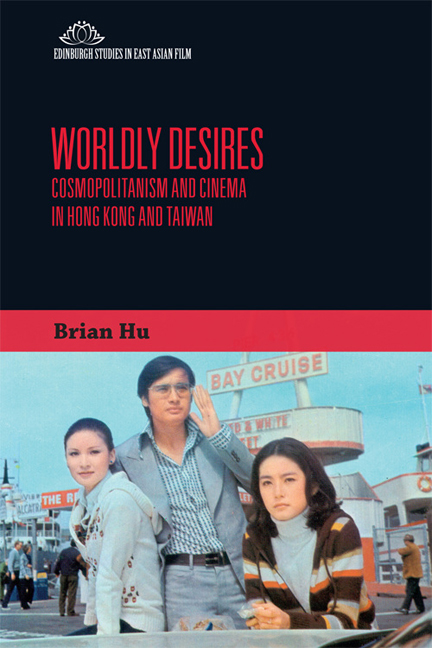Book contents
- Frontmatter
- Contents
- List of Figures and Tables
- Acknowledgments
- Notes on Romanization
- Introduction
- 1 Melodramas of Arrival and Departure: Jet-set Students in 1970s Taiwanese Romance
- 2 ABCs, Mixed-race Stars, and Other Monsters of Globalization
- 3 Setting the Stage: Hong Kong Musical Stars Take on the World
- 4 All the Right Moves: Mobile Heroes and the Shaolin Temple Film
- 5 The Cosmopolitan Brand: Film Policy as Cultural Work in the International Film Market
- Conclusion
- Works Cited
- Index
- Frontmatter
- Contents
- List of Figures and Tables
- Acknowledgments
- Notes on Romanization
- Introduction
- 1 Melodramas of Arrival and Departure: Jet-set Students in 1970s Taiwanese Romance
- 2 ABCs, Mixed-race Stars, and Other Monsters of Globalization
- 3 Setting the Stage: Hong Kong Musical Stars Take on the World
- 4 All the Right Moves: Mobile Heroes and the Shaolin Temple Film
- 5 The Cosmopolitan Brand: Film Policy as Cultural Work in the International Film Market
- Conclusion
- Works Cited
- Index
Summary
In 2001, Ang Lee went onstage at the Shrine Auditorium in Los Angeles to collect the Best Foreign Language Film Oscar for Crouching Tiger Hidden Dragon, Taiwan's submission to the annual competition. It was a landmark accomplishment for the transnational Chinese film industry, which, as I noted in Chapter 3, had been dreaming of Oscar success for decades. In 2006, Lee returned to the Oscar limelight, winning Best Director for Brokeback Mountain. In his 2006 acceptance speech, Lee thanked “everybody in Taiwan, Hong Kong, China” and closed with gracious words of thanks in Mandarin. Lee had already collected top prizes at the prestigious Venice and Berlin film festivals, but the Best Director Oscar had special resonance for Taiwan, which had never before seen one of its native sons heralded on the world stage on a scale as large as this. More than 38 million watched the broadcast in the United States alone, and surely many Taiwanese households had their TVs tuned to the Oscars to see Lee receive an award that had previously been given to some of the luminaries of world cinema. Unlike his 2001 win, which was awarded in a special category reserved for the foreign, Lee's 2006 Oscar was for, in theory anyway, the best directing accomplishment in the world by anybody, regardless of nation or language. Furthermore, it was for Brokeback Mountain, a film that, on account of its western settings and gay themes, felt as far away as possible from the conservative Taiwan that Lee grew up in, and a testament to Lee's ability to don the costumes of any nation and empathize with the sensibilities of any race or experience. Lee had, with the whole world watching and Hollywood applauding, been accepted as a great director of the world, regardless of background. And in that moment and on that stage, he dared utter the name “Taiwan,” so rarely heard in official diplomatic channels internationally, and dared speak in Mandarin. Lee did it again in 2013, when he won a second Best Director Oscar for Life of Pi, a multi-lingual fantasy set between continents and cultures. “I can't make this movie without the help of Taiwan,” he said onstage, positioning Taiwan as an engine of a cosmopolitan cinema. At these moments of triumph, he reminded the world and his countrymen of his ethnic and national background.
- Type
- Chapter
- Information
- Worldly DesiresCosmopolitanism and Cinema in Hong Kong and Taiwan, pp. 209 - 222Publisher: Edinburgh University PressPrint publication year: 2018



